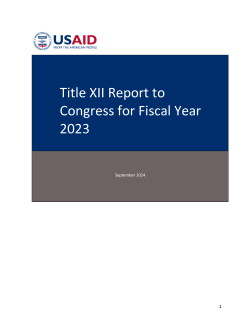Overall Summary of Fiscal Year 2023 Progress Across Feed the Future Innovation Labs
USAID partners with Title XII universities on a wide range of topics to leverage the advanced capacities of U.S. universities, including on agricultural research and development, analytics, climate change, and nutrition. Many of these partnerships are within the Feed the Future Innovation Labs (FTFILs), which focus on research to reduce hunger, poverty, and malnutrition as part of the U.S. government’s Global Food Security Strategy. In Fiscal Year (FY) 2023, the 22 FTFILs, supported by 83 U.S. colleges and universities in 39 states and U.S. territories, partnered with over 130 international institutions of higher education in 39 countries. These partnerships include both research and degree programs.
The FTFILs provide degree training to support the sustainability of food systems, agricultural and nutrition research, and development activities while helping develop the next generation of scientists. In FY 2023, the 22 FTFILs supported food security degree training for 305 individuals (47 percent female). Innovation Labs also provided 611 people with nutrition-related professional training (50 percent female), including 19 nutrition-related degrees.1 Innovation Labs hosted 33 exchange visitors in food and agriculture at U.S. universities, including doctoral and master’s degree candidates, research scholars, non-degree students, and short-term scholars.2 In FY 2023, the FTFILs reported production of 178 peer-reviewed scientific publications.
A FTFIL partners meeting was held in Nairobi, Kenya on May 15–19, 2023. The purpose of the meeting was to understand geographic differences, priorities, and trade-offs of climate change and embrace opportunities for local leadership and international collaboration.
A FTFIL annual meeting was convened in Washington, D.C., on September 12–14, 2023. The purpose of the meeting was to understand differing contextual approaches, priorities, and implications of inclusive gender research in agricultural innovation and development; spotlight systems and scaling obstacles while promoting transformative, equitable solutions; and seize opportunities for gender-focused leadership and global collaboration in driving inclusive innovation for improved livelihoods. Sessions included presentations on FTFIL approaches to innovate for social transformation, mainstream gender into traditional research agendas and scaling formulas, redirect innovation that could exacerbate inequality, and partner with minority-serving institutions (MSIs) for improved innovation, scaling, and local engagement.

